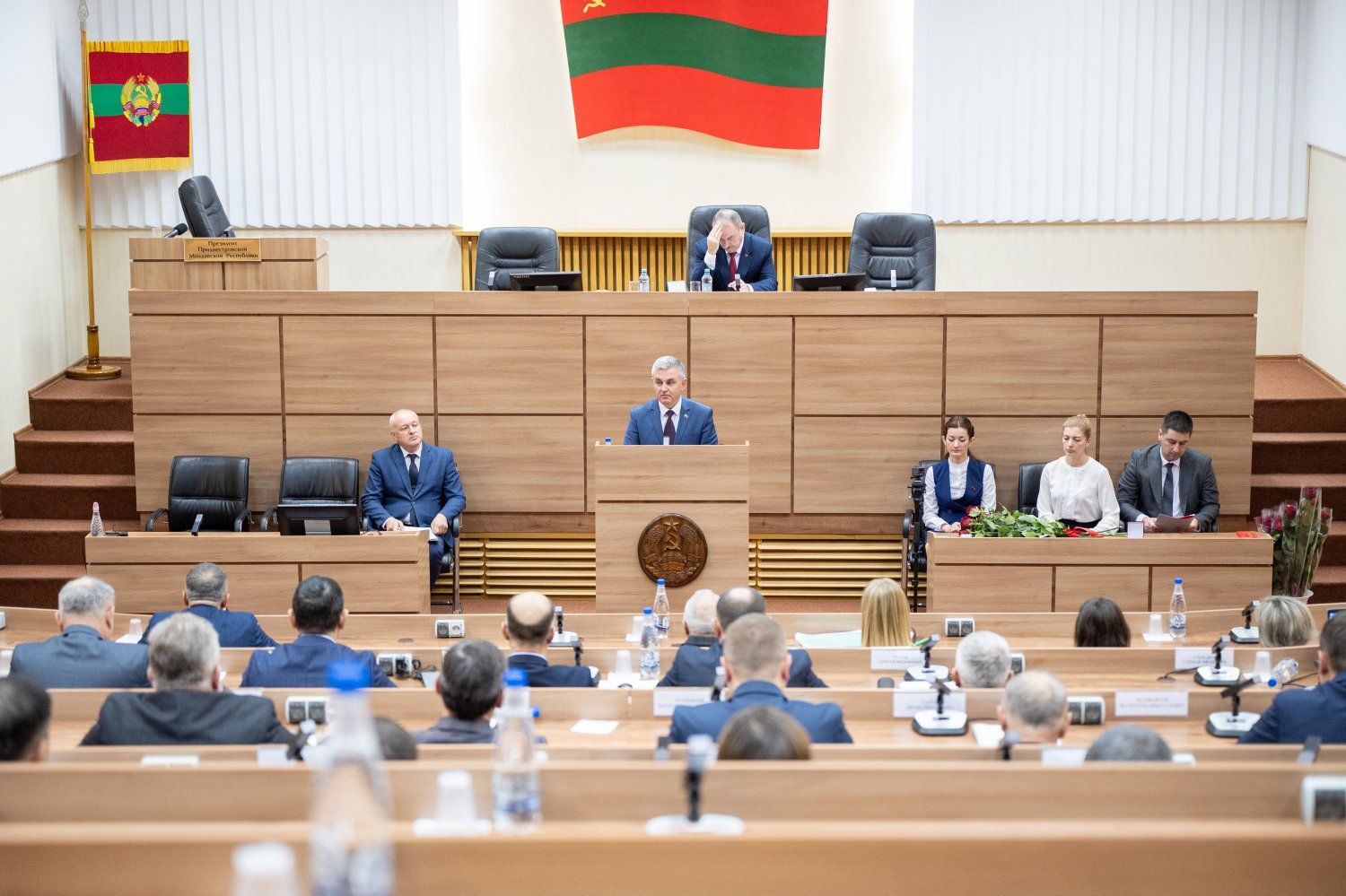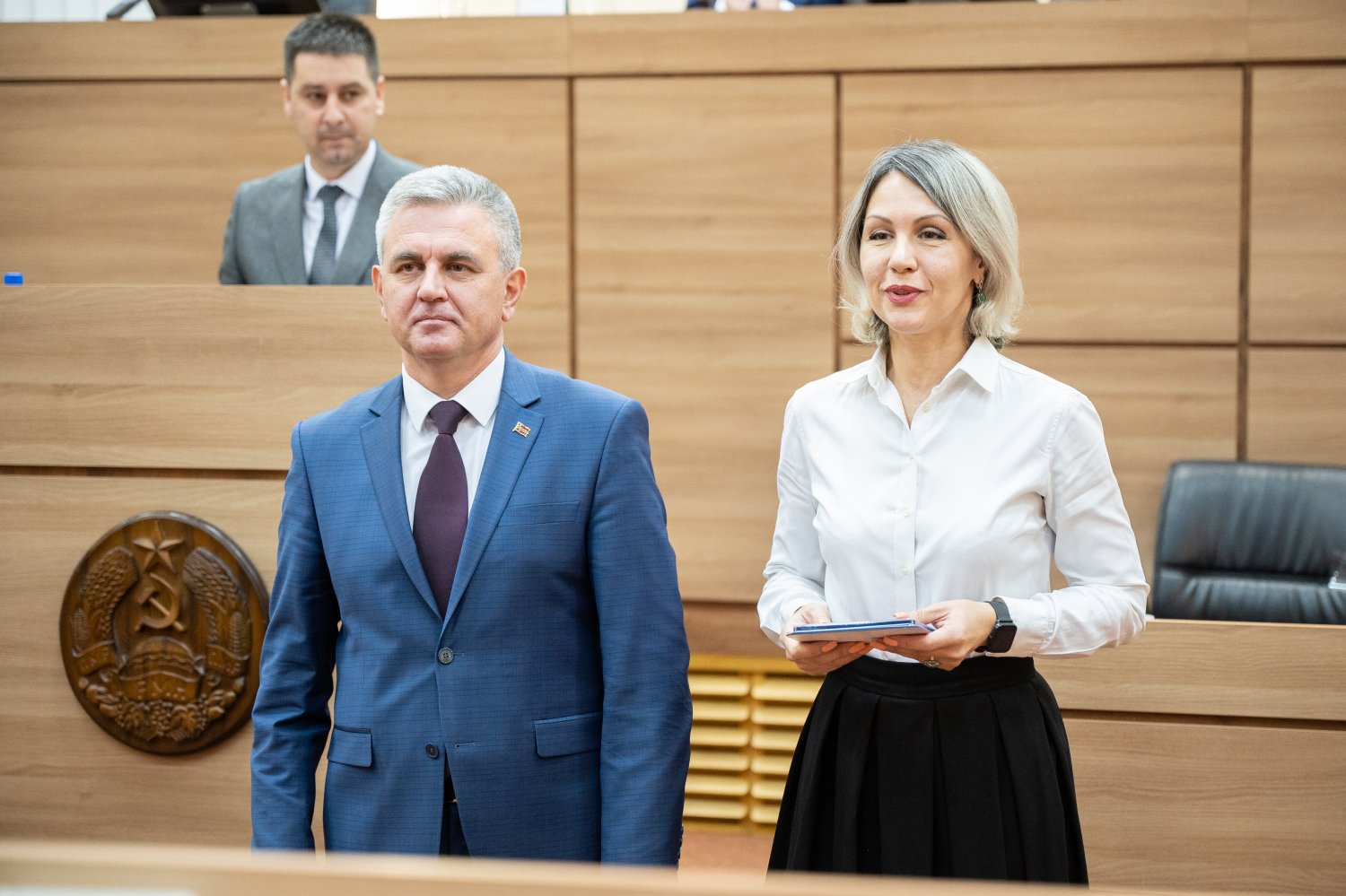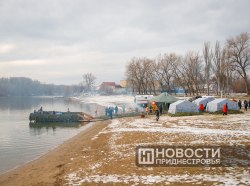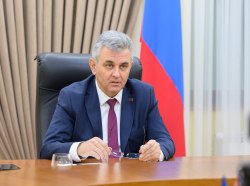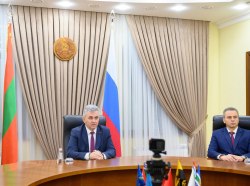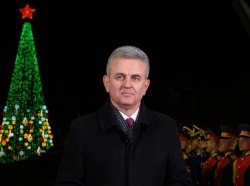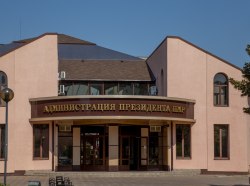The PMR Supreme Council celebrates the 33rd anniversary of its founding today. A ceremonial meeting took place in the plenary hall. The PMR President Vadim Krasnoselsky arrived to congratulate the parliamentarians and employees of the legislature of the republic.
The festive event was opened by the Chairman of the Supreme Council of the Pridnestrovian Moldavian Republic. Alexander Korshunov recalled in his welcoming and congratulatory speech that the first meeting of the first government body of the young republic took place on the 29th of November, 1990. The Speaker focused on the fact that the first composition of the deputy corps was formed from industrialists, farmers, and representatives of public organizations. The head of the legislature spoke about the priorities, main directions and principles of the activities of the current Supreme Council, without leaving aside continuity: the Consultative Assembly of the first Pridnestrovian deputies and the Youth Parliament operate under the legislature.
The President of the Pridnestrovian Moldavian Republic called the people's representatives and specialists who ensure the activities of the Supreme Council colleagues and comrades. Vadim Krasnoselsky before being elected President was a member of the deputy corps and headed the legislative body of the country of the sixth convocation.
“If we recall the historical milestones of the creation of the legislature of our state, then we must remember the events that preceded it, of course. The tragedy of our entire people is the collapse of the Soviet Union. There were a number of significant, but inherently negative events before this. We are talking about the so-called national movement of the union republics, when national elites under the dome of one party suddenly began to declare independence.
There were other solutions before this. The law on languages, for example. Parliamentarians of the Moldavian SSR declared back in 1989 one language – the Romanian language in the Latin script, ignoring the interests, opinions, desires of the entire multinational people of the then former Moldavian SSR.

Then, in the movement of such national nihilism, everyone began to repent, to deny everything, including previously adopted legal acts of an international nature, which was the Molotov-Ribbentrop Pact, of course. It has become fashionable to repent for this act, to repent for its consequences, to be in sackcloth and ashes. There would have been no Molotov-Ribbentrop Pact if we talk about the terms of this act, if there had been no Munich Agreement. But who talked about it, who thought about it? I want to recall the decision of the Moldavian parliament of June 23, 1990, when the Supreme Council of not Moldova, but no longer the Moldavian SSR (transition period) decided on the nullity of this document – the Molotov-Ribbentrop Pact, on the elimination of legal consequences and the illegality of the creation of the Moldavian SSR. I remind you that the Moldavian SSR was created by annexing Bessarabia to the MASSR, the existing MASSR. The MSSR appeared then. This happened just after the Molotov-Ribbentrop Pact. It would probably be fine then if it all remained on paper.
I want to name the main four signs that speak and declare as facts about Chisinau’s attitude towards Tiraspol.
The first fact is the denial of legal protection to people living on the left bank and in the city of Bendery. An example of this is the murder of the Moldavian SSR deputy Ostapenko, and the Joint strike committee member Gusar. The relatives of these victims sought legal protection from the Moldovan law enforcement agencies. The wife came with a statement that her husband was killed and asked, please, investigate it. The application was not accepted for consideration. Can you imagine? Legal protection to the people inhabiting the land was denied. It's a fact, it happened. That is, citizens living on the left bank, living in the city of Bendery, were isolated from the legal field of the state called Moldova.
The second point is pressure, an encroachment on language, traditions, customs, and so on. Romanianization was taken as a course there, of course. This is their choice. No questions, but there was an absolute lack of perception of the Moldovan, Russian, Ukrainian languages and traditions of people of other nationalities.
The third point is economic pressure – blockade measures that were put into effect against Pridnestrovie.
The fourth aspect is military operations, of course. The war, the act of aggression, that took place against Pridnestrovie.
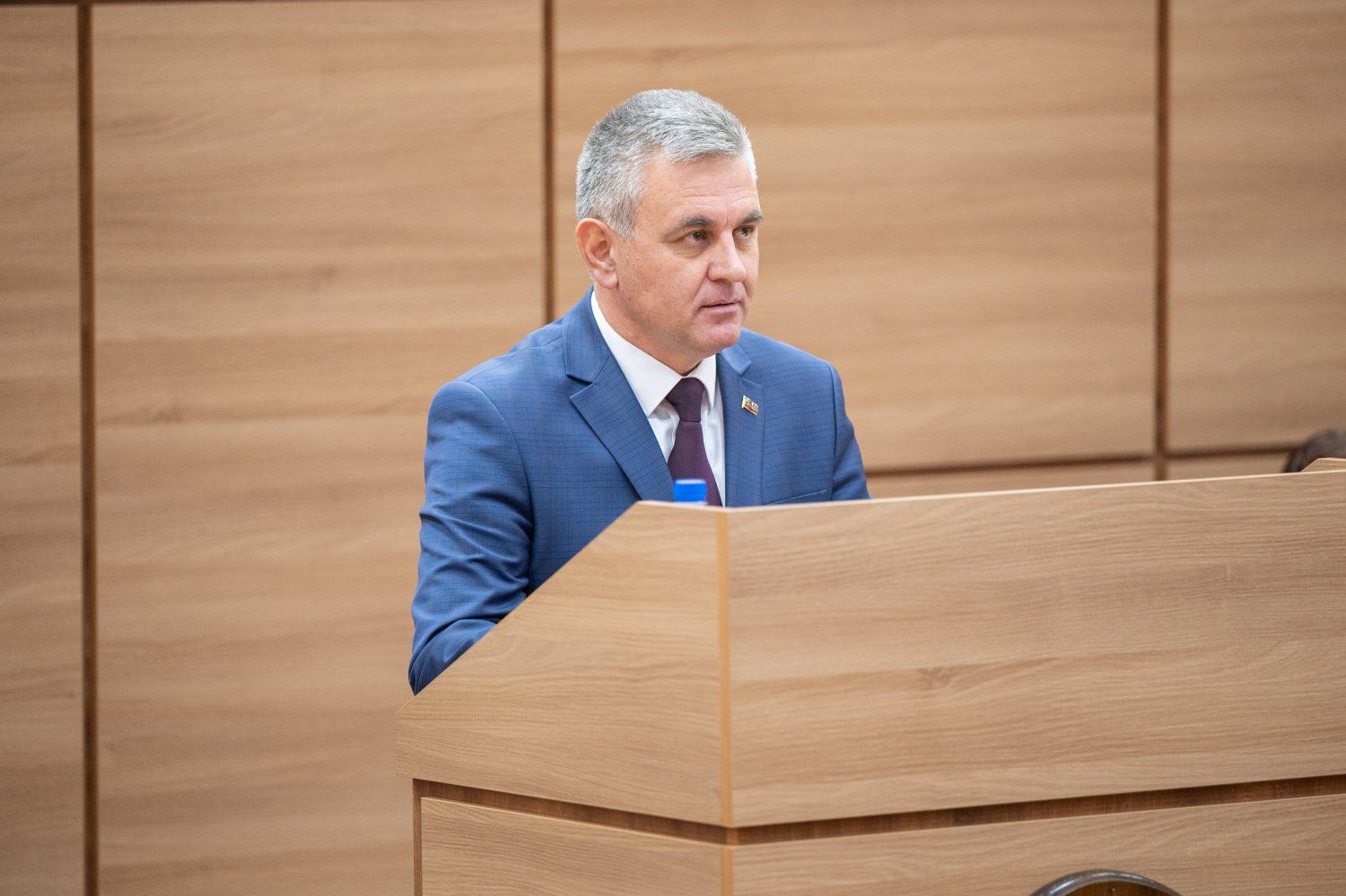
The people living here had to do something, create conditions for protection, develop the economy, and simply live while being protected in these conditions. Naturally, this would be impossible without the state. The essence and purpose of the formation of the Pridnestrovian Moldavian Republic is precisely in the need for physical protection of the lives, rights, and freedoms of citizens living here.
Of course, one of the first government agencies is the legislature. I will not focus on the history of its formation: the provisional, the Supreme Council, and so on. People created Pridnestrovie. The legislature is a representative of the citizens who live in our state.
What's up today? Not much has changed. Thank God there is no war. Everything else is present to one degree or another.
I would like to focus on a very important point. What happened during the thirty-three years of the existence of Pridnestrovie and the existence of independent Moldova? We must look at the people who grew up on these lands. What kind of people are here in Pridnestrovie? Moldavian only? No. Russian? No. Ukrainian? No. Bulgarian, Gagauz and so on? No. We have a multinational Pridnestrovian people, which includes 72 ethnic groups and nationalities. These are the Pridnestrovian people. It is a fact. What kind of people were created there, on the right bank, in Moldova? If we say that the people are determined by language, literature, traditions, history, then this is the new Romanian Bessarabian people, of course. This is also a fact. By the way, it is also multinational, people of many nationalities live there. Do you know what is terrible about this whole structure? There is place for Russians, Ukrainians, Jews, Poles in this Bessarabian Romanian people, but there is no place for Moldovans. Do you understand what the trick is? This historical fiction has led to the fact that there is no place for Moldovans in Moldova. This is a tragedy. The Moldovan language has been deleted from the international register of languages that exist in the world. People are not exterminated in a year or in five, ten, twenty, thirty, fifty years, of course.
We have preserved the Moldovan language, Moldovan traditions, and the Moldovan ethnic group as such in Pridnestrovie. By the way, this very preservation of Moldovan society, the Moldovan language, and Moldovan traditions was one of the goals of creating the MASSR. This is history. Things will probably get tougher in this regard in the future. There are very big problems with religiosity. You know it all perfectly well, you hear, you observe.
I want to say returning to the Supreme Council that it is impossible to imagine Pridnestrovie without the Supreme Council. Pridnestrovie was not an authoritarian state where a military colonel would come, as in some countries, and rule. No, in no case. The people, through their representatives, govern the state. This is the essence of true Soviet power – when the Council governs, ministers are approved by the Supreme Council. The Supreme Council plays an important role in the life of the state, of course. This is the principle of normal Soviet power, do you understand? Thank God we have it, it’s called differently, but still.
Dear colleagues, I call you colleagues, comrades because I was a deputy of the Supreme Council, headed the legislature, I remember this time, I know the essence of the activities of the Supreme Council. I sincerely congratulate you. I wish that Parliament will continue to be a platform for normal, healthy debate. Truth is born in dispute. There is only one thing there is no need to argue about: that Pridnestrovie is an independent state. We are an independent state and sooner or later we will achieve international recognition. This will happen, I have no doubt. May God grant us all to live to see this bright day. Naturally, the task of the Supreme Council is to bring this moment as close as possible, to be there, to help, to consolidate society around our common idea”, the President aimed.
Vadim Krasnoselsky presented state awards to the most distinguished employees of the Supreme Council apparatus. The PMR President was awarded the sign “For his contribution to the cause of parliamentarism” on the occasion of the 33rd anniversary of the legislature of the republic.
рственные награды. Вадим Красносельский по случаю 33-летия законодательного органа республики удостоен знака «За вклад в дело парламентаризма».


